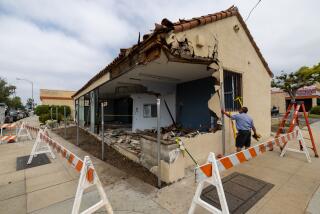Patient Rabbi : Hospital Helps Pasadena Get a Transfusion of Faith
- Share via
Virtually every Saturday morning, the new rabbi for Pasadena Jewish Temple rises from his bed at St. Luke Medical Center and walks a block to the synagogue where he leads the Sabbath rites.
“I’m so dedicated that I get out of my hospital bed to conduct services,” Rabbi Gilbert Kollin said with a laugh, describing his weekly routine.
Since July, Kollin has had a private room in St. Luke’s fourth-floor ambulatory unit, where he is a familiar sight to doctors and nurses during the Jewish Sabbath from Friday evening to Saturday afternoon.
“I sometimes worry,” he said half-seriously, “whether someone will make a mistake and plug a needle in me, cart me away and remove a vital organ.”
Make no mistake, Pasadena Temple didn’t hire a sick man--Rabbi Kollin hikes halfway up Mt. Wilson each weekend with several temple members. However, an ailing housing market did leave Kollin in a dilemma.
Previously the rabbi for nine years at Hollywood Beth El, Kollin this year accepted the pulpit position in Pasadena, assuming that he would soon sell his home in the Beverly-Fairfax area and move with his wife and youngest son near the temple. But house sales have fallen off sharply in recent months because of a glut of listings.
“That was a problem for me because I don’t drive on the Sabbath,” Kollin said. As a rabbi affiliated with the Conservative movement, Kollin is not required to follow Jewish law prohibiting driving on the Sabbath as rigorously as his Orthodox brethren.
“But I just never have driven on the Sabbath,” he explained. “The core of the Sabbath means ‘stop,’ ‘slow down,’ ‘stay where you are.’ ”
Kollin commutes by car from his home other days and drives to Pasadena on Friday afternoon before dusk. The problem was what to do after conducting the Friday night service for the 475-family congregation.
“But there is no hotel or motel near here, and I didn’t want to impose on temple families who live nearby,” he said.
Because St. Luke Medical Center was so close to the synagogue, Kollin went to the hospital’s executive director, Samuel W. Pangburn. “I made a discreet inquiry about any available rooms on the weekend,” Kollin said.
Pangburn, also a new resident in the area, was sympathetic with the rabbi’s problem in selling his house. “I had just gone through the same thing,” Pangburn said.
Since a room was usually available on the weekend, Pangburn came up with a plan. He offered free accommodations in exchange for the rabbi’s chaplaincy services. “He calls on patients who have need of some support,” the administrator explained.
Kollin broke his Sabbath routine only on Rosh Hashanah, the Jewish New Year, when he stayed with a family that belongs to the temple.
But Kollin returned to Room 402 at the hospital last weekend and he expects to keep checking in weekly until the housing market improves.
“It’s perfect for the situation,” he said. The room comes with a bathroom and a cushioned, adjustable chair, and he is permitted to use the doctors’ shower room.
Kollin observes Jewish strictures against handling money during the 24-hour Sabbath by using a meal card in the hospital cafeteria. It’s not a kosher kitchen, but the rabbi says he manages by sticking to fruits, cereal and the salad bar.
Kollin does not follow the Orthodox tradition of avoiding turning on lights or electrical gadgets. And so, he can enjoy the television in his room.
“I go back to my room Saturday afternoon for a little nap, then return to the temple for our 5 p.m. study group,” he said.
How is the bed?
“Hard as a rock,” the rabbi confessed, “but you’re not going to hear me complain.”
More to Read
Sign up for Essential California
The most important California stories and recommendations in your inbox every morning.
You may occasionally receive promotional content from the Los Angeles Times.













